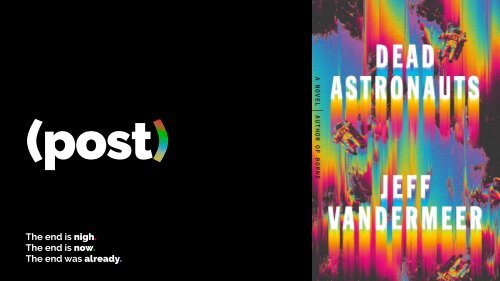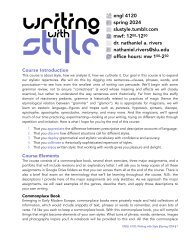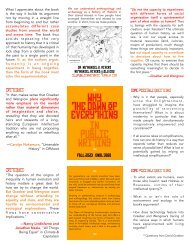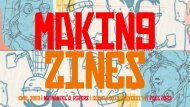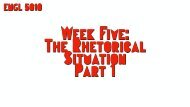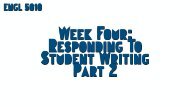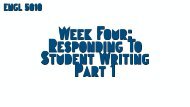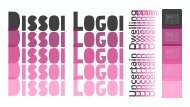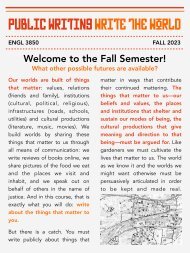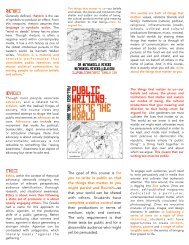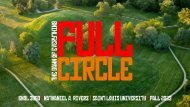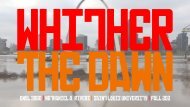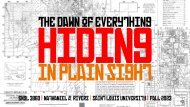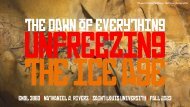ENGL 6040: VanderMeer Keynote (SP22)
Create successful ePaper yourself
Turn your PDF publications into a flip-book with our unique Google optimized e-Paper software.
(post)<br />
The end is nigh. <br />
The end is now. <br />
The end was already.
7 “What version is this?”<br />
<br />
7 “Zero. It’s version zero.” <br />
7 “Do you trust me?” <br />
7 “I do.” <br />
7 “I will.”<br />
<br />
7 “Even when I’m not me.” <br />
7 “I will, Moss.” <br />
0 “And I will always be there.” <br />
Even before I know you. <br />
Even after I’ve known you. <br />
Even then.<br />
7 “Do you love me?”<br />
<br />
7 “I do.”<br />
<br />
7 “Hold on to me, then.”
“<br />
One can only do justice to space travel by<br />
recognizing it as—beyond the motives of<br />
individual agents—a key d i s c i p l i n e o f<br />
experimental anthropology: it is the hardest<br />
school of naïveté-breaking procedures with<br />
regard to the human condition, for through its<br />
radically eccentric replacement formations for<br />
the coexistence of humans with their own kind<br />
and others in a shared whole it enforces an<br />
unrelenting spelling course for even the smallest<br />
details of the immanence machine (Sloterdijk<br />
301).<br />
Kathleen Neeley for Subterranean Press<br />
(post)
(post) reading<br />
(post) theory<br />
“<br />
It wasn’t Charlie X’s fault, in a way, even though it<br />
was all his fault. Charlie X just thought in the old<br />
ways. Plants couldn’t feel pain, animals were<br />
objects to be manipulated as products or<br />
resources. Because he didn’t see the systems the<br />
way Moss came see the systems. Because he<br />
thought soft tech should serve the same master<br />
as hard tech before it (<strong>VanderMeer</strong> 96).<br />
(post)
iterations<br />
nonhumans<br />
contaminations<br />
joys<br />
Kathleen Neeley for Subterranean Press<br />
(post)
Drawing Dead Astronauts<br />
1. Pick one of the focal points below<br />
2. Locate a resonant scene or moment in the novel<br />
3. Compose an illustration that transduces that moment<br />
or scene with/in line, shape, texture, form, space, color<br />
and value <br />
4. Share your illustration [Drive]<br />
iterations versions nonhumans actors contaminations leaks joys …<br />
(post)
iterations<br />
“<br />
The compass that does not know its name. The<br />
map that does not know its borders. The journey<br />
in search of a destination (<strong>VanderMeer</strong> 313).<br />
(post)
iterations<br />
“<br />
They had failed in the last City, and the one before<br />
that, and the one before that. Sometimes that<br />
failure pushed the needle farther. Sometimes that<br />
failure changed not a thing. But perhaps one day<br />
a certain kind of failure might be enough<br />
(<strong>VanderMeer</strong> 3).<br />
Sylvia Wynter cities Frantz Fanon: ”I am willing to<br />
work on the psychoanalytical level—in other<br />
words, the level of the 'failures,' in the sense in<br />
which one speaks of engine failures.” To which<br />
Wynter adds, “For it is at this level that certain<br />
discoveries can be made” (Wynter, “Towards the<br />
{Sociogenic Principle” 37).<br />
(post)
(post) york<br />
revisited<br />
“<br />
But by the same token, this repetition is precisely a part of what has always<br />
interested me, that is, how does a formal repetition allow us to capture beings<br />
that are otherwise inaccessible (Latour 9)?<br />
(post)
iterations<br />
“<br />
History would go on without her, the Compnay<br />
and the foxes, and all the rest. And yet on it went.<br />
Their quest, in some form. Even without them. The<br />
future would still be the future, in some form.<br />
Until the dead astronaut grew old. Or until the end<br />
of the world. Whichever came first (<strong>VanderMeer</strong><br />
319).<br />
It involves no progress and no solution because<br />
nothing is broken for what comes. That is what life<br />
{after aftermath is (Robertson 157).<br />
(post)
iterations<br />
“<br />
Real enough was the anchor that kept them from<br />
falling apart. Through all the versions<br />
(<strong>VanderMeer</strong> 16).<br />
(post)
iterations<br />
“<br />
Things that can be said. Things that can’t be said.<br />
You know them both. Still the smokestacks belch<br />
smoke. Still you tunnel under the bridge, you will<br />
never be quit of the place. You will never be quit.<br />
You will live always, even when you don’t. You will<br />
never have the right to decide or to understand.<br />
You will only have the right to help or not help.<br />
Through all the versions. Yourself. Not yourself<br />
(<strong>VanderMeer</strong> 203).<br />
(post)
nonhumans<br />
“<br />
You want. Things to be words. That are not<br />
words. Could never be words. Your fox is some<br />
other construct. We did not agree to that. We do<br />
not call ourselves foxes. A thing you created that<br />
is not me. To think an autopsy was a person. To<br />
think a dissection meant a type of mind. If I went<br />
rummaging through your carcass, would I find you<br />
(<strong>VanderMeer</strong> 258)?<br />
(post)
nonhumans<br />
“<br />
In this City, as in all Cities, the three knew they<br />
would find the foxes. Moss loved the foxes, while<br />
Grayson suspected them—thought them already<br />
too clever, believed, perhaps, the foxes had led to<br />
their failures, as much as the insidious nature of<br />
the Company had. <br />
Chen had no opinion, for in his calculation<br />
the foxes must always be part of the plan. So he<br />
wasted no emotion on them one way or the other<br />
(<strong>VanderMeer</strong> 27).<br />
(post)
nonhumans<br />
“<br />
The Company never sang to Behemoth, asked<br />
nothing of him except that he devour. In this way,<br />
Behemoth read the ripples he left behind, the<br />
rings. Knew thereby he was the lord of the water.<br />
Free. To eat. To sleep. To shit. To pull himself back<br />
and forth between the holding ponds. As if<br />
Behemoth had been made to describe such a<br />
path until the end of days (<strong>VanderMeer</strong> 131).<br />
(post)
nonhumans<br />
“<br />
This was the story: Over all the forest beyond their<br />
home and the little shed, over all of it. Over all.<br />
Ruled the forest mind. Which seemed to slumber<br />
and not remember and be simple. To be made of<br />
earth and trees and clouds and birds. But was<br />
actually awake in a way no person could be<br />
awake. Slumber that was not sleep. Mind that was<br />
not mind. A person could never imprison that<br />
mind, only destroy parts of it, bit by bit. But as<br />
long as even a small piece remained, it could<br />
never die. Would never die. <br />
Might save you to save itself or, in the end,<br />
might not even notice you small and huddled<br />
against the wall of a tunnel (<strong>VanderMeer</strong> 184).<br />
(post)
contaminations<br />
“<br />
Dead astronauts were no different than living<br />
astronauts. Neither could shed their skin. Neither<br />
could ever become part of what they journeyed<br />
through. Suits were premade coffins. Space was<br />
the grave. Better to think of yourself as dead<br />
already. There was freedom in that; liberated the<br />
mind to roam quadrants farther than the body<br />
(<strong>VanderMeer</strong> 106).<br />
(post)
contaminations<br />
con (together with) + tangĕre (to touch)<br />
“<br />
Read once that salamanders can be poisoned by<br />
touch. How any oil or soap, any unnatural thing<br />
can hurt them. That you can hurt by touch. That<br />
you can hurt another living being just by<br />
existing in the world. Just by passing through the<br />
world. That is all. That is all. Panic, wanting to pull<br />
away, to preserve, to avoid causing damage<br />
(<strong>VanderMeer</strong> 186)<br />
What did contamination mean in this city, and<br />
which way did it flow (<strong>VanderMeer</strong> 45)?<br />
{Everything was contaminated. Nothing was<br />
(<strong>VanderMeer</strong> 45).<br />
(post)
“Life in the Broken Places” (Jeff <strong>VanderMeer</strong> + FSG)<br />
(post)
contaminations<br />
“<br />
It had to be translated on either side, strained<br />
through layers, halting, pushing forward.<br />
Sometimes what translated into supposed words<br />
was emotion or reaction. Approximates that had<br />
to be trusted in the moment, before these<br />
approximates became slippery and escaped into<br />
the mire. Because the translation was a kind of<br />
virus, and Moss trusted she was infecting the fish<br />
and not the fish Moss.<br />
<br />
(<strong>VanderMeer</strong> 66)<br />
(post)
contaminations<br />
“<br />
Moss was letting the blue fox into her mind. The<br />
farther into that labyrinth the fox explored, the<br />
more of the gift the fox would receive. For it<br />
would understand their mission, gain more<br />
understanding of the Company, and also see how<br />
the foxes had helped them across so many Cities.<br />
That was the hope. <br />
(What bled through, into the head? Where<br />
did they travel all unknowing? This in Moss’s mind<br />
as disturbance, registering in Chen as a<br />
possibility: v.2.1 = 2.2 + 2.3 + 3.0 + the things that<br />
could pull a mind apart if examined close up.)<br />
(<strong>VanderMeer</strong> 28)<br />
(post)
joys<br />
“<br />
Such joy in the sight. So much joy you feel that<br />
the pain leaves you for a time. To see a river that is<br />
full of wriggling red bodies. Tiny eyes so bright,<br />
staring as one at you, and then swept downriver.<br />
Changing the river, changing this world. A river<br />
aflame. Dispersed and disbanded and yet ever<br />
stronger in that fragmented state (<strong>VanderMeer</strong><br />
201).<br />
(post)
v.7.0<br />
“The desert foxes, snapping their jaws and joyous,<br />
ate up what was left of Moss. They gamboled and<br />
leapt across the mist and meadow of her corpse<br />
and devoured her bit by bit (<strong>VanderMeer</strong> 108).<br />
joys<br />
Loss of bounded self is only truly horrifying within<br />
an anthropocentric framework that prizes human<br />
being in its current state over all other forms and<br />
ways of being. Active self-annihilation might,<br />
paradoxically, offer a path toward ecosystemic {preservation (Wilk 13).<br />
(post)
joys<br />
“<br />
The joy of running, The joy of digging. The joy of<br />
hunting earthworms through the dirt . The joy of<br />
the wind against fur. The joy of muddy paws. The<br />
joy of sleeping next to mate and kits. The joy of<br />
climbing trees. The joy of swimming in streams.<br />
The joy of mating and raising children. The joy of<br />
dining burrows. The joy of playing in meadows.<br />
The joy of snapping at fireflies at dusk. The joy of<br />
napping on smooth stones, on moss, on beds of<br />
ferns. The joy of the warmth on fur. We lived in joy,<br />
the joy of living without interference, without<br />
persecution, without unnatural threat. The joy of<br />
running (<strong>VanderMeer</strong> 294).<br />
(post)
“<br />
But, in the end, joy cannot fend off evil. <br />
Joy can only remind you why you fight<br />
(<strong>VanderMeer</strong> 301).<br />
joys<br />
(post)
(post)<br />
The end is nigh. <br />
The end is now. <br />
The end was already.


